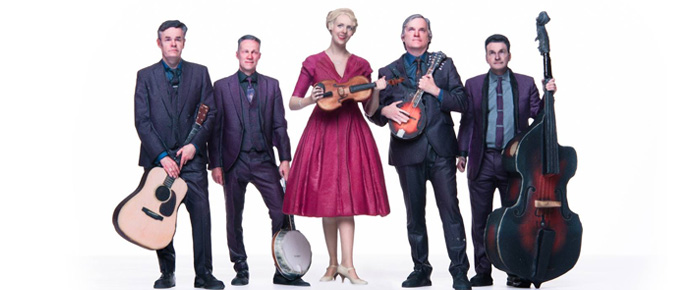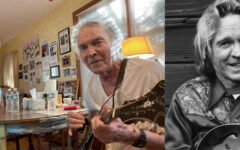
The Coal Porters have always been something of an anachronism. For starters, they’re a bluegrass band based in London, led by an American expat, Sid Griffin. Even so, there’s no denying the Coal Porters’ commitment to their cause. Griffin, a veteran of the pioneering ‘80s Americana outfit the Long Ryders, was well versed in this particular style of music long before he relocated to London, and, to his credit, has authored various tomes on Dylan and the roots of America’s seminal country rock sound. Early Coal Porters albums have name-dropped Chris Hillman, Gram Parsons and David Crosby, making no mistake about where their influences lie. And while their latest, No. 6, shows no shyness about stretching their parameters — The Day the Last Ramone Died hails the pioneering punk rock combo mentioned in the title, just as a catchy cover of the Only Ones’ otherwise obscure Another Girl – Another Planet shows a willingness to look outside the genre — the band’s partiality to grassicana never wanes.
“I moved to London from Los Angeles to woo a fair maiden, and indeed that is what happened,” Griffin explains. “I started a family and have been here ever since. Lately I have been thinking about moving home, but with the tenor of the nation under Trump, there is no way my family will even consider this.”
When Griffin founded the Coal Porters, it seemed something of a bold leap, taking an inherent American style and then serving it back to the Brits. Still, in listening to their music, one might not be aware of any cultural incongruity given the Coal Porters’ feckless and flawless delivery. Their cheery combination of banjo, fiddle, dobro, and mandolin makes for a sound that rings and resonates with universal appeal. The band itself is decidedly international — Griffin originally hails from Kentucky, guitarist and co-founder Neil Herd is Scotch and fiddler Kerenza Peacock, bassist Andrew Stafford and banjo player Paul Fitzgerald are English.
Happily, Griffin was able to convey his intents to his bandmates, and they quickly found their common cause. “American music largely, if not exclusively, comes from Scotland, Ireland and England, so it was no trouble for the Coal Porters to grasp what I was trying to translate musically for European ears,” he notes. “They got it almost immediately and I have learned much from them. The learning curve was surprisingly small in terms of musical ideas and influences. Obviously some of their knowledge has worn off on me too. Riding in vans, trains and planes with any group of people for years is bound to expand your thinking in many ways and the Coal Porters are no exception.”
Griffin describes the Coal Porters’ music as “alt-bluegrass,” a style he defines as universal and timeless. “It’s not simply bling and fashion or romantic love, but staples like death, family, the home, the land, fear of what the future might hold. Those topics will never go out of style. It is impossible for that to happen. As long as we breathe and live and love, those topics will be with us.”
Nevertheless, Griffin admits that he was initially disappointed with the reaction they received. “I foolishly thought the UK music scene would be like that in the USA, as my music has always been popular here and in Europe,” he says in hindsight. “I was wrong. Anyone who plays music based on musical signposts from the past is confined to the folk market, and if it is a rock band, they are Mod Revivalists or Brit Pop, or whatever. Much of Europe is tribal, be it nationalism, favourite football club, ethnic origin, or even musically speaking. So you get people who wear a cowboy hat and are awful at C&W, but are still accepted because they have the form down.”
The idea of a fickle music scene never occurred to him at the time, making for a somewhat daunting introduction. Even so, he didn’t let that indifference deter him.
“I had no idea, moving over here, how tough it was gonna be,” Griffin recalls. “I had no idea who something like Salt n’ Pepa or Milli Vanilli could be a big thing here, and then no one give a rat’s ass about them two or three years down the line. Meaning of course, why should they care about me or my music? My heroes are folks like Aretha or Robbie Robertson or Magic Sam or Little Esther or Bill Monroe…hardly names on most British folks’ lips.”
Nevertheless, Griffin suggests that Americana is an enduring musical form, regardless of locale. By tapping into folk traditions that transcend both sides of the Atlantic, the band eventually found they could create a clear connection.
“It is a music from and for the ages,” he says of those sounds. “It is not dependent upon anything as temporary as current fashion or the whims of the greater public. You can be overweight or underweight, in a tuxedo or in street clothes, male or female, young or old, whatever. All that matters is — can you and the song deliver an emotional impact to the listener? No more, no less. Nothing else is asked of the performer or the song. Nothing.”








